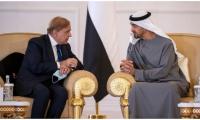ISLAMABAD: Prime Minister Imran Khan Wednesday said no one is disturbed from the opposition’s movement and the government is not bothered about it.
Addressing a meeting of the government spokespersons here, the prime minister said the opposition will not get NRO come what may. He said some of the PTI’s own candidates lost elections with a very narrow margin. He asked why the opposition did not approach the courts over so-called rigging in elections.
The prime minister said the thieves had joined hands to protect their theft, adding that he had already predicted it. He said the government allowed the public rally of the opposition so that they could not use the card of political victimisation.
Imran Khan said the government was taking steps to control the price hike. He said raids are continuing on hoarders and the Tiger Force is also identifying profiteers and hoarders.
The sources said the prime minister asked the spokespersons to highlight the alleged spending of Rs2.5 billion in the by-election of NA-120 in 2017. The premier said Rs2.5 billion were spent to ensure victory for Begum Kulsoom Nawaz in the by-election.
Meanwhile, Imran Khan congratulated the Foreign Office (FO) on Pakistan’s re-election to the UN Human Rights Council (HRC), vowing that Islamabad will continue to expose India’s rights violations in the Indian Occupied Jammu and Kashmir (IOJ&K).
Taking to Twitter, Imran Khan said that he was pleased with Pakistan’s re-election to the UN body for another three-year term.
“We remain committed to upholding human rights for all, prioritising advancement of tolerance and constructive engagement. We stand resolute against Islamophobia and in support of mutual respect,” said the premier.
The PM also vowed that Pakistan will work towards building consensus and ensure that the council’s “work is guided by principles of universality, impartiality, dialogue and cooperation”. “Pakistan will continue to expose human rights violations committed with impunity by the Indian occupation forces in Indian Occupied Kashmir,” said the PM.
While lauding the FO, Imran Khan also appreciated the role Pakistan’s missions abroad played in “another diplomatic achievement, enhancing Pakistan’s profile and recognition on the international stage”.
Meanwhile, the prime minister directed the provincial governments to consider out-of-the-box solutions to increase revenue at the provincial level. Stressing on the need for a provincial finance award, the prime minister said that transparent and equitable distribution of revenue and revenue at the district level was essential for the process of uniform construction and development in the provinces.
He made these observations while chairing a high level meeting on the development needs of Khyber Pakhtunkhwa, especially the integrated areas and Punjab. The meeting was attended by federal ministers Asad Umar, Fawad Ahmad Chaudhry, Umar Ayub Khan, Finance Adviser Dr Abdul Hafeez Shaikh, Khyber Pakhtunkhwa Chief Minister Mehmood Khan, Finance Minister KP Taimoor Saleem Jhagra and other senior officials. Punjab Chief Minister Sardar Usman Bazdar, Punjab Finance Minister Makhdoom Hashim Jawan Bakht, Chief Secretary Punjab also attended the meeting through video link.
The meeting discussed in detail the development needs of the integrated areas and the province of Punjab and the issue of provincial finance award.
Addressing the meeting, Imran Khan said that the federal government was committed to the uninterrupted development of the integrated areas. The prime minister reiterated his commitment to provide all necessary financial resources for the amalgamated areas.
The prime minister said that most of the resources in the previous governments were limited to a few areas keeping in view the political priorities which affected the development process in the backward areas and created a sense of deprivation among the people of these areas. He noted that equitable distribution of financial resources among the districts at the provincial level is one of the top priorities of the present government.
The premier urged the provincial governments to pay special attention to empowering the districts and local governments in terms of revenue so that the resources derived from these areas could be better utilised for the development and improvement of the areas.
In this regard, he emphasised that special attention should be paid to generating financial resources by utilising government property so that more resources can be created to offset the government revenue affected by the coronavirus and spent on the welfare of the people.
The meeting also considered the issue of net hydel profit due to Punjab and Khyber Pakhtunkhwa and a working group has been constituted to resolve the issue amicably. The prime minister appreciated the efforts of the Ministry of Planning in resolving the issue of Provincial Financial Award and net hydel profit.
Meanwhile, federal ministers said at a press conference that Pakistan is grappling with the challenge of high food inflation not because of scarcity of commodities, but due to artificial shortages being created by hoarder and profiteers especially of sugar and wheat, however the government is taking administrative and financial measures to quell these illegal practices.
Minister Shah Mehmood Qureshi, National Food Security and Research Syed Fakhar Imam and Minister for Industries Hammad Azhar addressed the press conference. Fakhar Imam said that Pakistan has currently wheat stock of 5 million metric ton while import has already been started and by January 2021, public sector import will touch 1.7 million ton. Private sector is likely to import 0.7 million metric ton of wheat. This will be much sufficient against the country’s total demand from now to April 15 next year which has been estimated around 6 million ton. “So we have sufficient quantity of wheat in stocks and there is no shortage,” he said.
During last season, Pakistan’s wheat production was 25.25 million ton against the target of 27 million ton, to meet the shortages, the government allowed private and public sector to import the grain.
The federal and provincial governments procured around 6.6 million ton of grain against the target of 8.2 million ton, the reason being low production due to the climatic changes. It was procured at minimum support price of Rs1400 per forty kilogram.
Interestingly, international parity price of the grain compared to local price was high that also encourages speculators and hoarders who exploited the situation. Sensing the negative impact in market, the federal and Punjab governments started releasing the stocks and since July 1.4 million ton wheat has been released but unfortunately Sindh government did not release even a single grain.
Fakhar Imam said that since July, the government had written frequently to CM Sindh to start releasing wheat from its stocks as to quell the hoarding of wheat by mafias, but it did not release and now has announce to start releasing from 16 October.
Hammad Azhar said Trading Corporation of Pakistan (TCP) has imported 150,000 ton sugar, which will be released on controlled rate around 10 to 15 rupees less than market rate, while similar quantity is being procured by the private sector. Of this, 55,000 ton sugar has reached Pakistan and another 100,000 ton is in pipeline and will reach Pakistan in next two weeks. He said, “The government is also considering importing more sugar if required.”
“In May 2020, we were told that 0.3 million ton sugar is surplus but on 22 July, the provinces informed us that there is 0.25 to 0.3 million ton shortage,” he said.
After verification, a strange thing came into the front that in Punjab, against the normal lifting, three-time more sugar was been lifted from the mills.
“In Punjab, we started physical verification of stocks at sugar mills, and for the last two months we are asking Sindh government to start physical verification but so far nothing has been done.” He said that we have requested the provinces to do legislation for making it obligatory to start the crushing of sugarcane from 10th of November.
It has been also proposed to impose a fine of Rs5 million/day on a sugar mill, if it fails to start crushing on this date. He said that earlier the fine was Rs50 to 60 thousand a season not per day. He said that the Punjab government had increased the sugarcane support price from Rs190 to 200/maund.
Shah Mehmood Qureshi said federal government will take all administrative measures to control rates of essential commodities, including sugar and wheat.
He said that only federal government cannot control it, the provinces should also come forward. He said that centre has taxing tool through which it can help reduce prices while provinces have to take administrative actions. He said that we will take financial and administrative measures to take the prices down to affordable levels.
Qureshi informed that on Monday, the ECC and subsequently on Tuesday the federal cabinet will meet to upward review the wheat support price from existing Rs1400/40kg. He said that we are aware that the cost of production of the farmers has also increased. This decision will encourage them to grow more and then we shall not face such a situation.
Later to a question, Fakhar Imam said there is 30 to 35 days of wheat shortage, but due to hoarding and windfall profiteering the situation was been exploited.
Qureshi said that the Punjab government that was earlier releasing wheat of 16,000 ton/day, now it has been decided to increase it to 25,000 ton a day. Flour mills have been asked not to keep wheat in stores more than a certain limit and grind the wheat and release to the market. “We are also considering to provide targeted subsidy to the poor on these items.”
Saad was of the view that the battle of politics should be fought solely through political means
KP govt decided to develop gemstone business as a formal export sector and cluster at the Namak Mandi would be...
Khyber Pakhtunkhwa Minister for Higher Education, Archives, and Libraries, Meena Khan Afridi. — APP FilePESHAWAR:...
Vehicles and horse carts passing through flood water at Bara Bazar area on Khuwani bridge after heavy rain in Peshawar...
Amid the failure to revive the cash-bleeding PIA, government is left with no other option but to sell it to any...
Picture showing the Silver Jubilee Gate of the University of Karachi. — APP File KARACHI: The University of Karachi...







